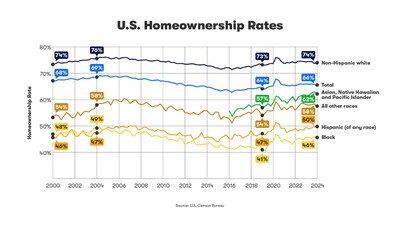Black homeownership rate rises, but hasn't returned to 2004 level
The homeownership rate for Black households has grown faster than average since 2019, but remains below the 2004 peak of 49.7%, currently at 46%. Almost 1 in 4 Black mortgage applicants are denied, compared to 1 in 10 white applicants, primarily due to credit history issues. The value of Black-owned homes is significantly lower, contributing to a $3 trillion wealth gap between Black and white families. Zillow is leveraging technology to mitigate these disparities, advocating for changes to credit scoring to include rent payments and making down payment assistance easily accessible.
Despite improvements, the gap in homeownership rates and home values between Black and white households remains substantial, affecting wealth accumulation and financial stability.
- Black homeownership rate increased to 46% from 43% in 2019.
- Zillow is advocating for changes to credit scoring to include rent payments, potentially improving credit access for Black households.
- Home shoppers can now easily check down payment assistance eligibility on Zillow's platform.
- Zillow released the Fair Housing Classifier to address biases in real estate conversations using AI.
- Black homeownership rate remains below the 2004 peak of 49.7%.
- Nearly 24% of Black mortgage applicants are denied, compared to 12.6% of all applicants and 10% of white applicants.
- Credit history is a significant barrier, with 43% of Black applicants denied for this reason.
- Black-owned homes are valued significantly lower than white-owned homes, contributing to a $3 trillion wealth gap.
Insights
From a market research perspective, the recent increase in Black homeownership rate is a relevant development. This trend can signal a shift in housing demand patterns, potentially affecting sectors such as real estate, mortgage lending and homebuilding. However, the continued disparity between Black and white homeownership highlights underlying structural issues in the housing market. These disparities in credit access and home values suggest that while there has been progress, significant barriers remain. Investors should consider how these systemic issues might impact long-term market dynamics, especially as companies like Zillow attempt to address these challenges through technology and policy advocacy.
Beyond the immediate impact on homeownership rates, Zillow's efforts to incorporate rental payments into credit scores and its push for legislation to improve credit reporting could lead to broader financial inclusivity. If successful, these initiatives might expand the pool of potential homebuyers, creating new opportunities and demands in the housing market. However, the effectiveness and adoption of such measures remain to be seen. Investors should monitor legislative developments and adoption rates of these technologies to gauge their potential long-term impact.
From a financial analysis standpoint, the rise in Black homeownership, though still below pre-recession levels, suggests an uptick in economic participation among Black Americans. This could have broader implications for consumer spending and credit markets. However, the high mortgage denial rates for Black applicants due to credit history indicate a persistent risk factor. Given that 24% of Black mortgage applications are denied compared to 10% for white applicants, this disparity presents a barrier to wealth accumulation and economic stability for Black households.
In the short term, companies engaged in the mortgage and financial services sectors might face criticism and regulatory scrutiny if they cannot address these disparities. Over the long term, broader systemic changes—such as incorporating rent payments into credit scores—could gradually improve access to homeownership for Black households. Investors should evaluate companies on their ability to adapt to these changes and their commitment to promoting financial inclusivity, as these factors could influence their market position and risk profile.
The gap between Black and white homeownership rates closed over the pandemic, but disparities remain
- Nearly 1 in 4 Black mortgage applicants are denied, versus 1 in 10 white applicants.
- Credit history is the most common reason given for denying a Black applicant.
- If the typical home was worth
$1 85 cents and white-owned homes worth$1.03
Insufficient credit is holding many Black households back from homeownership. Nearly 1 in 4 mortgage applications from Black borrowers —
That's almost twice the rate of all applicants (
"While discriminatory policies like redlining have long been outlawed, the damage from these historic practices is still felt today. Many communities once barred from accessing credit are now finance deserts, with few traditional financial institutions, making it harder to build credit and buy a house," said Zillow senior economist Orphe Divounguy. "That's why it's so important to expand credit access. Allowing rent payments to count in credit scores is one example of how to move the industry forward."
Today, nearly
Although the gap between white homeownership rates and those of Black and Hispanic households has diminished since 2019, the deficit is still large and contributes to vast inequalities in wealth.
The single largest asset for most homeowners is their house, and it's a major means of building wealth and passing it on to the next generation. Zillow Research found a
Despite rising faster than average since 2019, Black-owned home values are still far lower than average. If the typical home was worth
How Zillow leverages technology to understand and address housing inequality and accessibility challenges.
- Rent payments made to landlords on the Zillow Rentals platform can now count toward a renter's credit score. Zillow is pushing for systemic, national changes on this front, advocating for bipartisan legislation that would encourage property owners and utility and telecom providers to report payment data to credit reporting agencies. This would give consumers who pay their bills on time the chance to build a positive credit history.
- Home shoppers can see what down payment assistance programs they could qualify for on every Zillow listing, saving shoppers the hassle of looking up their eligibility on various government websites.
- Continuing its investment in new technology to address biases and inequalities in housing, Zillow recently released the open-source Fair Housing Classifier. This free and easy-to-access new tool establishes guardrails to help prevent historic biases from resurfacing in real estate conversations powered by large language model (LLM) technology.
1 For conventional purchases of a primary residence.
About Zillow Group
Zillow Group, Inc. (Nasdaq: Z and ZG) is reimagining real estate to make home a reality for more and more people. As the most visited real estate website in
Zillow Group's affiliates, subsidiaries and brands include Zillow®, Zillow Premier Agent®, Zillow Home Loans℠, Trulia®, Out East®, StreetEasy®, HotPads®, ShowingTime+℠, Spruce® and Follow Up Boss®.
All marks herein are owned by MFTB Holdco, Inc., a Zillow affiliate. Zillow Home Loans, LLC is an Equal Housing Lender, NMLS #10287 (www.nmlsconsumeraccess.org). © 2023 MFTB Holdco, Inc., a Zillow affiliate.
![]() View original content to download multimedia:https://www.prnewswire.com/news-releases/black-homeownership-rate-rises-but-hasnt-returned-to-2004-level-302157526.html
View original content to download multimedia:https://www.prnewswire.com/news-releases/black-homeownership-rate-rises-but-hasnt-returned-to-2004-level-302157526.html
SOURCE Zillow









